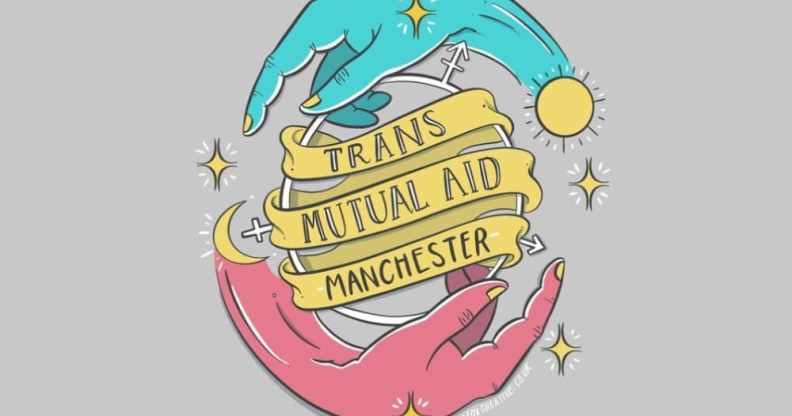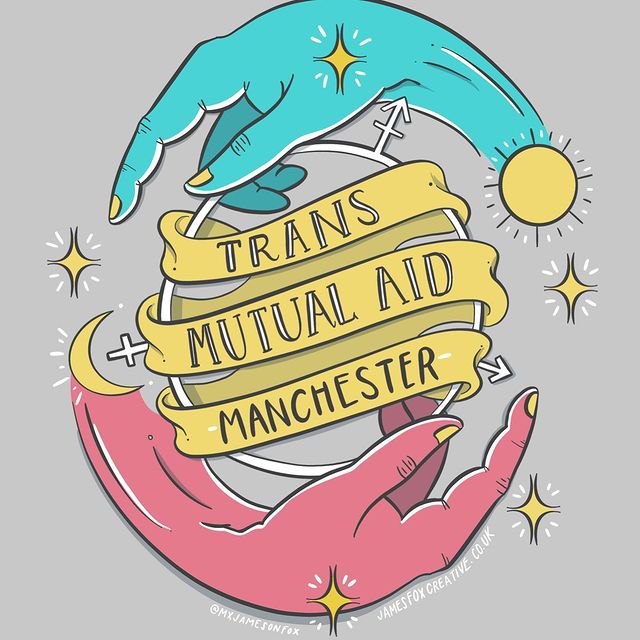Solidarity, not charity: How a group of trans activists are fighting for their marginalised peers ignored by the system

Trans Mutual Aid Manchester illustration by James Fox Neville. (Instagram/MxJamesonfox)
Mutual aid is about solidarity, not charity, as Trans Mutual Aid Manchester explains to PinkNews.
A sorry hallmark of the coronavirus pandemic is that the hardships faced by marginalised groups – including trans and non-binary communities, sex workers and disabled people – have been disproportionately exacerbated.
As employment, housing and healthcare became even more insecure, many of these communities have taken matters into their own hands, with the concept of mutual aid entering the mainstream consciousness like never before.
From the Sex Worker Advocacy and Resistance Movement (SWARM) hardship fund for sex workers to the Black Trans Foundation Therapy Fund, organisers within communities have been working to get financial and practical support to those who need it.
While the groups and communities most affected by COVID-19 are diverse, a defining feature of the organising has been solidarity, not charity. Another theme has been an intentional move away from relying on state institutions, charities or those outside the community to provide help.
Trans Mutual Aid Manchester is one newly established mutual aid group in the UK. PinkNews spoke to the organisers to find out more.
PinkNews: What is mutual aid? How does it work?
Trans Mutual Aid Manchester: Mutual aid is… very hard to define properly! Effectively it’s a community directly looking after itself, often necessary when the state refuses to. Mutual aid often involves sharing of resources and networks of support that function independently of oppressive systems.
It can look like giving out free food to anyone who needs it, solidarity funds like ours, or the sharing of information necessary for survival such as in sex work community networks. A great example is the free breakfast program run by the Black Panthers in the US in the ’60s and ’70s.
With mutual aid, we support each other to live well, without the need for someone to prove to yet another institution that they’re deserving of help.
It’s fundamentally different from charity, which creates a hierarchy between the giver and receiver of aid and support, often leading to unpleasant power dynamics. It’s notable that Mermaids, often held up as the trans charity, is mostly run by cisgender people. With mutual aid, we support each other to live well, without the need for someone to prove to yet another institution that they’re deserving of help.
Mutual aid understands that we live in a holistic political context, that giving a trans person money for rent can support their health and transition to the same extent as giving it for gender-affirming surgery or hormones.
How will Trans Mutual Aid Manchester support the local trans and non-binary community?
We’re currently raising money from donations and online fundraising events for our Solidarity Fund. The fund will be open to trans and non-binary people in Greater Manchester early next year, for emergency housing costs, transition-related medical costs not effectively provided by the NHS, clothing and makeup, really anything that will help with comfort, safety, and health.

Trans Mutual Aid Manchester illustration by James Fox Neville. (Instagram/MxJamesonfox)
Applications are open to any trans or non-binary person based in Greater Manchester. To make sure this solidarity is accessible to those in our community who need it most, priority will go to people of colour and those affected by transmisogyny.
We’re also working on some other projects to support the local trans community. This includes a Small Trans Library project for sharing and borrowing books, and creating a searchable database of trans healthcare experiences, to help local trans people find knowledgeable and supportive medical care outside of the gatekeeping Gender Identity Clinic (GIC) system.
Why have you set up Trans Mutual Aid Manchester? What led you to this point?
At the moment, we’re in the first wave of fundraising and still getting the word out about the project as we’re a newly established group.
We’re made up of trans and non-binary people in Greater Manchester. We believe that solidarity and community support through mutual aid is one way we can undermine systems; those that are set up to keep us from having ownership over our own identities and bodies.
We recognise that trans people, particularly those affected by transmisogyny and racism, are disproportionately more likely to face unemployment or to be unhoused. This, as well as the difficulties of navigating transition in the face of years-long waiting lists for treatment on the NHS and an increasingly hostile environment in the mainstream media, makes mutual aid necessary.
We have flyers!
If you're a business or organisation in the Greater Manchester area we would be incredibly thankful if you were to display one on our behalf. Even a RT or post to your own website / social media will help. pic.twitter.com/l6MgVo2XOj
— Trans Mutual Aid Manchester (@transMAMCR) November 16, 2020
What are the key issues facing trans people in Manchester? How will the mutual aid fund help address them?
Most issues facing trans people in Manchester are those facing us across the country. Homelessness, mental health issues, the increasing aggression towards trans people in the press and the streets, austerity and welfare cuts etc. Some of these, especially that last one, are more prevalent in Manchester and the North of England in general, and so there’s a lot of different issues that small grants with no strings attached (as we’re planning on providing) can help people.
Manchester has some really good support in general for LGBT+ people, but it tends to be focus in the centre, so we want to support trans and non-binary people based in the whole of Greater Manchester. The commercialisation of the city, and gay village particularly, strips the area of its political roots, thereby allowing trans oppression to be brushed under the rug
In terms of access to medical transition, there aren’t currently any NHS gender services in Manchester, although one is planned to open next year. Those of us who wish to pursue medical transition through the NHS are currently on excessively long waiting lists at clinics in other parts of the country, so there are a lot of us here who can really benefit from this support.
Manchester has a huge trans community, and we feel that this is a great opportunity to combine our time, resources and energy to support those members of our community who are struggling the most.
View this post on Instagram
Who are the other community organisers and organisations that you’re inspired by, and why?
In looking for a model and a precedent for setting up the project, we were inspired by SWARM and their COVID support fund for sex workers, which was very successful in providing emergency grants for sex workers who had lost income due to lockdown measures.
We’ve also been influenced by organisations like the Dublin Small Trans Library, who also run a COVID emergency solidarity fund in addition to sharing books.
Also, groups like ACORN have shown that mutual aid really works in Manchester, with their eviction defence work and sharing of food and information during the pandemic especially.
The model of the solidarity fund comes from the work of Action for Trans Health, who operated a similar project that ended up raising tens of thousands of pounds, which would be amazing to follow up, and unfortunately is no longer operational.
How can cis people best support – do you have a donation pot?
The best way to support us is by setting up a small recurring donation through our website, the price of an iced coffee a month would really make a big difference.
The best way to help us keep the solidarity fund sustainable is to set up a small recurring donation. This money will be redistributed to trans and nonbinary people in need in MCR, with priority given to people affected by racism and transmisogyny.https://t.co/Mji1EKwx4A pic.twitter.com/Rrpg8KZfNf— Trans Mutual Aid Manchester (@transMAMCR) September 21, 2020
This is the main way we can make sure there’s always some money in the solidarity fund for people who need to access it. We’ve also had some great success with individual fundraising initiatives from individuals and LGBT+ groups, so please feel free to get in touch if you’re up for doing something to help us raise funds!
We’d also really appreciate people sharing and following us on social media, to help get us on the radar of people who want to apply for grants in the spring.

